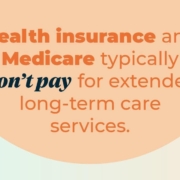Saving Strategies for Older Singles – Wall Street Journal

The Wall Street Journal
Retirement Planning – August 28, 2011
Weighing the Odds of Disability, for Insurance Purposes
By Anne Tergesen
A growing number of Americans are heading into their retirement years as single adults. With no spouse to rely on, these individuals need to take extra precautions to ensure a secure retirement.
Due in part to increases in divorce rates and the proportion of the population that never married, about 35% of 50- to 54-year-olds were single in 2010, up from almost 29% in 2000, according to the Census Bureau. Among 55- to 64-year-olds, 33% were single in 2010, versus 30% in 2000.
While those without dependents may have little need for life insurance, advisers say it’s important to carry adequate levels of liability, disability and long-term-care insurance.
Comments August 28, 2011
According to the Social Security Administration, approximately one-third of Americans entering the work force today (3 in 10) will become disabled before they retire. According to the American Payroll Association, 71% of American employees live paycheck to paycheck, without insufficient savings to cushion the financial impact of a disability.
A mere 10% of disabling accidents and illnesses are work related. The other 90% are not, which means Workers Compensation does not cover them. Although many people assume most disabilities are the result of accidents, the majority of disabilities are due to illnesses. The two most common reasons for new disability claims are musculoskeletal/connective tissue related (23% of claims) and cancer (14% of claims).
When evaluating a disability insurance policy verify that the policy covers both partial and total disabilities. A non-severe (or partial) disability limits or prevents the amount or kind of work you can do; a severe disability (or total) disability prevents you from working altogether. According to the U.S. Census Bureau, 32% of disabilities are non-severe and 68% are severe.
Seriously consider purchasing an own-occupation disability insurance policy. With this type of policy the insurance company does not penalize you for going back to work in a different occupation while on claim. With this type of policy if you have a sickness or injury and cannot perform your occupation, you will be considered totally disabled, even if you choose another occupation.
Aaron Skloff, AIF, CFA, MBA
CEO – Skloff Financial Group
Aaron Skloff, Accredited Investment Fiduciary (AIF), Chartered Financial Analyst (CFA), Master of Business Administration (MBA), is the Chief Executive Officer of Skloff Financial Group, a Registered Investment Advisory firm. The firm specializes in financial planning and investment management services for high net worth individuals and benefits for small to middle sized companies. He can be contacted at www.skloff.com or 908-464-3060.












